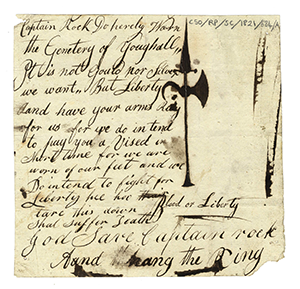Chief Secretary’s Office, Dublin Castle, 1818–30
Published in 18th–19th - Century History, Issue 5 (September/October 2017), News, Volume 25New on-line catalogue from the National Archives, Ireland.
By Martin Fagan, Nigel Johnston and Vera Moynes

Above: A warning from ‘Captain Rock’ nailed to Youghal post office in December 1821. (NAI)
This anonymous notice (above/below), nailed to Youghal post office in December 1821, raised sufficient concern for the town’s mayor to transmit it to the chief secretary in Dublin Castle, with an accompanying note warning of the ‘discontented evil spirit’ that was ‘fast approaching’. It is just one of the 33,500 items contained in the updated catalogue to the Chief Secretary’s Office Registered Papers, which has just been placed on-line by the National Archives, Ireland. The records comprise various documents—letters, petitions, memoranda, affidavits, accounts, reports and returns—submitted to the heads of the Irish administration.
Fortunately, the clerks of the period tended not to ‘weed out’ incoming mail, resulting in a diverse collection in which official government correspondence appears side by side with unofficial correspondence from private citizens. An 1826 memorial from the Anglican archbishop of Armagh, for example, concerning building work to the archbishop’s residence, which he deems to be ‘deficient and inconvenient in several particulars and too small’, sits alongside a memorial from Anna McCormick, an impoverished widow living in Whitefriar Lane, Dublin, in 1826, lamenting her plight ‘in a cold garret in a state of starvation’. All strata of society, all geographical areas and all manner of topics are therefore represented in a collection that provides a unique insight into Irish society in these decades between the Act of Union and the Great Famine.
‘… On the night of Sunday last, the house of Owen Whelan of Shragh near Dromelly, was burglariously entered by four persons, who, in the absence of the proprietor, dragged his wife out of bed, held her by the hands and feet and with a sharp instrument cut her ears in a shocking manner.’
This extract from an 1830 police report from Kilrush, Co. Clare, is part of the collection’s Outrage Papers sub-series. The woman was taken into care by a local doctor and bound to appear before the next petty sessions. Her attackers, according to the report, were her husband’s relations, ‘persons of notorious bad character’, who were attempting to gain possession of the holding.
The subject of law and order features heavily in the papers, as the government reacted to issues like the above-mentioned case of agrarian violence as well as faction fights, sectarian conflict and political movements like the Catholic Association and the countrywide mobilisation against tithes. The period also saw the broadening of the reach of central government through, for example, the development of a centralised police force and the creation of modern asylums and prisons like Waterford’s House of Correction (above/below). This resulted in an ever-increasing volume of papers passing through the chief secretary’s hands.
Local historians and genealogists may be particularly interested in the many petitions included in the papers, which contain lists of names and signatures for a period with little surviving census material. An unsuccessful campaign for the erection of a public cloth market in Dublin in 1826, for example, resulted in separate petitions from the ‘Cord and Calico Weavers’ of Prosperous, Co. Kildare, and the ‘Cotton Linen Silk Stuff and Mitten Weavers’ of Tullamore, Co. Offaly, yielding between them the names of over 620 individuals in addition to accompanying reports on the cloth trade.
Some petitions do not concern the well-being of a group but rather plead for one individual. In May 1830, John Starkey of Liverpool wrote on behalf of John D. Holt, a family friend and bookkeeper who had been sentenced to transportation for embezzling £1,520 from his employers in Dublin. He offers a close psychological narrative to describe how Holt came to commit the deed:
‘These [thoughts] rushing at once upon his mind, the refusal now to afford him the opportunity to obtain by his own industry a plain subsistence, goaded him to madness, and the rash thought presented itself that he had then upon his person the means of enforcing justice from [his stepfather] Holdsworth’.
In this way, the papers can shed light on people’s circumstances and motivations, within the universality of human experience.
The on-line catalogue, covering the years 1818 to 1830, is the product of an ongoing cataloguing project with funding from the Professor Francis J. Crowley Bequest and the Department of Culture, Heritage and the Gaeltacht. The catalogue is freely searchable at http://www.csorp.nationalarchives.ie/ and the documents are available for public consultation at the National Archives of Ireland, Bishop Street, Dublin—see http://www.nationalarchives.ie/.
Martin Fagan, Nigel Johnston and Vera Moynes are archivists for the Professor Francis J. Crowley Bequest, National Archives, Ireland.
















